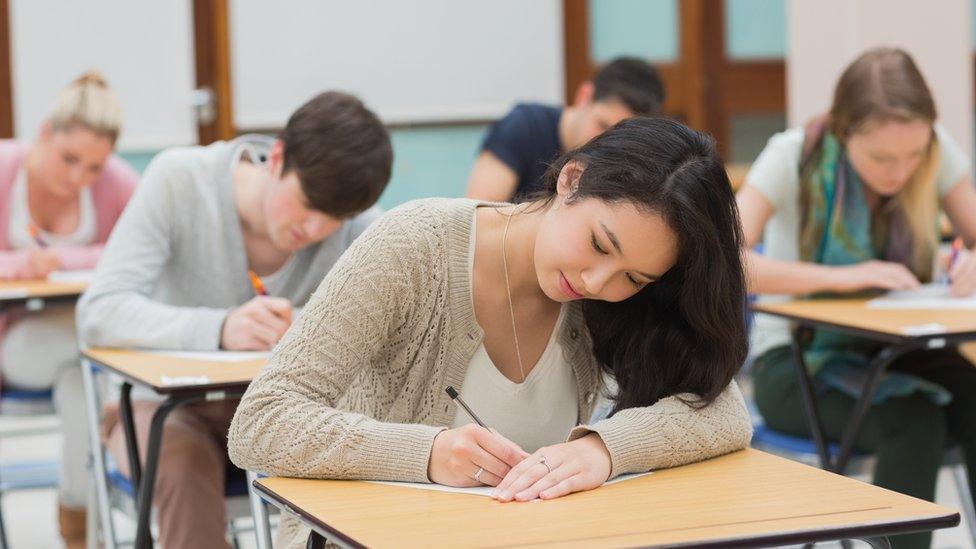Unconditional offer students 'more likely to drop out'
- Published

Eighteen-years-olds in England who are given unconditional university offers before taking their A-levels are more likely to drop out in their first year of degree study, research finds.
The Office for Students says 185 students, who would have been expected to continue, dropped out in the academic years 2015-16 and 2016-17.
The watchdog says its findings are a "real cause for concern".
The number of institutions offering unconditional offers has been rising.
These are offers made without specifying that the student has to achieve any particular grades.
In 2018, 67,915 were made to 18-year-olds from England, Northern Ireland, and Wales - up 65,930 from the previous five years, when just 2,985 were made.
The rise has led to concerns that universities are operating a "bums on seats" mentality, and that sixth-formers might not work as hard and get as good grades as they could at A-level and in other qualifications.
Now the OfS has analysed data for 18-year-olds in England at English universities and colleges who do not continue from their first year into a second year, either at the same university or by transferring to another.
The watchdog controlled for other factors which can affect dropout rates, such as the type of university, subject choice, disability and ethnicity.
Its analysis suggests that the dropout rate is 0.65 percentage points higher - or 10% proportionally higher - for students who accept an unconditional offer.
The OfS warns that if these patterns continue and the rate of unconditional offers made continues to rise, more than 200 students a year - who would have been expected to continue their degree studies - could drop out.
'Real concern'
Nicola Dandridge, chief executive of the OfS, said: 'We already know that students who receive an unconditional offer are more likely to miss their predicted grades at school.
"It is a cause of real concern that they are also more likely to drop out of university once they get there.
"Dropout rates are overall low in England, so this is a small effect. But we are not talking about one or two students.
"This is a couple of hundred students per year who have made a significant investment of time and money in a degree from which they are unlikely to benefit.
"As our regulatory framework sets out, admissions systems must be reliable, fair and inclusive. What we are seeing here are admissions systems that are not fair, and are not working in students' best interests."
A spokesman for Universities UK said there were "clear benefits" in universities being able to use a variety of offer-making practices to reflect an individual student's circumstances, potential and the context of their application.
"An important principle of the UK system is that universities decide independently which students they accept; but with this comes a responsibility to explain why and how places are awarded, and to show the public and students why different types of offers are made," he added.
Education Secretary Gavin Williamson said: "I have already expressed my deep concerns about the continuing rise of unconditional offers.
"But what is equally alarming is that dropout rates for students with unconditional offers are estimated to be 10% higher than if they had a conditional offer.
"Students are being let down by the universities that are using these offers to get students through the door, but then not adequately supporting them once they begin their studies."